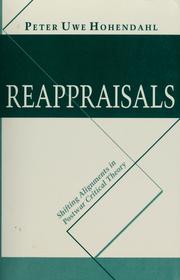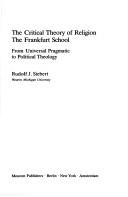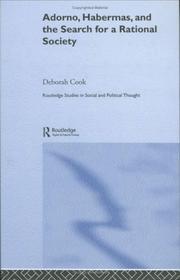| Listing 1 - 10 of 14 | << page >> |
Sort by
|
Book
ISBN: 2735127834 2735126919 9782735126910 Year: 2020 Publisher: Paris: Maison des sciences de l'homme,
Abstract | Keywords | Export | Availability | Bookmark
 Loading...
Loading...Choose an application
- Reference Manager
- EndNote
- RefWorks (Direct export to RefWorks)
La publication en 2013 d'une version reconstruite du texte de Kracauer Die totalitäre Propaganda (1937-1938) a renouvelé la perception que l'on pouvait avoir de cette dimension de son oeuvre et de son apport à une "théorie critique de la propagande" . La réflexion sur la propagande s'inscrit dans le contexte plus vaste de l'élaboration par les exilés allemands, au tournant des années 1930-1940, d'une grille de lecture du national-socialisme, vu comme une pathologie de la modernité, ainsi que dans celui des grands projets de recherches américains sur la propagande nazie (auxquels Adorno et Kracauer ont été associés).Au sein de la nébuleuse de la "Théorie critique" Kracauer exprime, comme Benjamin, un point de vue à certains égards dissonant. A rebours d'une approche qui insiste surtout sur la continuité entre capitalisme et nazisme, il se montre particulièrement sensible à la séduction esthétique du fascisme, et à sa mise en scène d'une réalité de substitution, qui est selon lui l'expression d'une fuite en avant nihiliste : ses analyses concrètes ne portent pas tant sur les contenus du message que sur le langage même de la propagande, et la vision de la société et de l'histoire qu'elle véhicule, dans sa forme même.Le débat complexe qui se développe à cette époque entre Adorno, Benjamin et Kracauer met notamment en oeuvre les catégories de "fétichisme" (Adorno), de "fantasmagorie" et d' "esthétisation du politique" (Benjamin), d' "apparence" et de "pseudo-réalité" (Kracauer). Il présente en premier lieu un intérêt historique, en tant que l'analyse du nazisme constitue pour le projet d'une théorie critique une mise à l'épreuve, qui suscite de vifs débats internes et aboutit chez Adorno et Horkheimer, dans la Dialectique de la raison (1944-1947), à une reformulation de ce projet.Mais dans un contexte aujourd'hui bien différent, les thèmes qui sont débattus entre ces protagonistes, comme celui de la dérive autoritaire du libéralisme, des manipulations de masse, de la construction médiatique du réel n'ont rien perdu de leur actualité.
Critical theory --- Propaganda --- Kracauer, Siegfried, - 1889-1966 --- History --- philosophie --- xxe siècle --- communication --- séduction ésthétique --- histoire des idées --- École de Francfort
Book
ISSN: 12485284 ISBN: 9782271093240 2271093244 2271142547 Year: 2017 Publisher: Paris: CNRS,
Abstract | Keywords | Export | Availability | Bookmark
 Loading...
Loading...Choose an application
- Reference Manager
- EndNote
- RefWorks (Direct export to RefWorks)
La théorie critique de la société, telle qu’elle s’est développée dans le cadre de ce qu’on appelle parfois l’école de Francfort, se caractérise notamment par le fait qu’elle donne toute son importance aux dominations et aux conflits dans son analyse du monde contemporain. L’une de ses figures aujourd’hui centrales, Axel Honneth, est aussi l’auteur de la théorie de la reconnaissance sans doute la plus systématique et riche en perspectives théoriques et critiques. C’est de cette théorie qu’Emmanuel Renault part dans ce livre, tout en lui apportant des inflexions justifiées d’une part par l’histoire de la théorie critique, d’autre part par l’analyse du temps présent. L’analyse de l’imbrication de la reconnaissance, de la domination et du conflit demande une approche spécifique : l’apport du pragmatisme américain et les débats sociologiques contemporains, en particulier Dewey et Bourdieu, complètent ici le modèle hégélien et les intuitions de Marx. Quelques exemples choisis parmi des objets souvent délaissés par les sciences sociales – la conduite oppositionnelle d’un groupe de punks squatters, le langage protestataire de jeunes de banlieues populaires – mettent à l’épreuve la capacité d’analyse de l’approche proposée par l’auteur, celle d’une philosophie sociale conçue comme une hybridation de la philosophie et des sciences sociales. Une contribution d’importance au cœur des débats les plus actuels.
Conflits sociaux --- Pouvoir (philosophie) --- Philosophie sociale --- Reconnaissance (philosophie) --- École de Francfort (philosophie) --- Philosophie --- 2ram --- Recognition (Philosophy) --- Social conflict --- Power (Philosophy) --- Critical theory --- Reconnaissance (Philosophie) --- Pouvoir (Morale) --- Théorie critique --- Hegel, Georg Wilhelm Friedrich, --- Honneth, Axel, --- Criticism and interpretation --- Théorie critique --- Criticism and interpretation. --- Philosophie sociale. --- École de Francfort. --- Philosophie. --- Philosophy --- Political Science --- conflit --- philosophie sociale --- reconnaissance --- domination --- école de Francfort

ISBN: 080149706X 9780801497063 1501705458 9781501705458 0801424550 9780801424557 150170544X Year: 1991 Publisher: Ithaca, NY : Cornell University Press,
Abstract | Keywords | Export | Availability | Bookmark
 Loading...
Loading...Choose an application
- Reference Manager
- EndNote
- RefWorks (Direct export to RefWorks)
Reappraisals is a provocative account of the development of modern critical theory in Germany and the United States. Focusing on the period since World War II, Peter Uwe Hohendahl explores key debates on the function of critical theory, illuminating the diverse positions and alliances among the participants. Bringing together six essays, as well as new introductory and concluding chapters, Hohendahl interprets and subjects to critical scrutiny many of the central ideas of the Frankfurt School. He first maps the trajectory of neomarxist criticism in Germany to the 1980s. Individual chapters then focus on the work of Georg Lukacs, Theodor W. Adorno, and Jürgen Habermas, and on such issues as the politicization of German criticism after 1965 under the influence of the Frankfurt School.
Book
ISBN: 9782875620255 2875620258 9791036547775 Year: 2013 Volume: 2 Publisher: Liège: Presses universitaires de Liège,
Abstract | Keywords | Export | Availability | Bookmark
 Loading...
Loading...Choose an application
- Reference Manager
- EndNote
- RefWorks (Direct export to RefWorks)
Suite à la dissolution de la perspective marxiste et aux transformations néo-libérales du capitalisme à la fin des années 1970, la Classe ouvrière s’est éclipsée : après des décennies de déclin social et d’invisibilité politique, les ouvriers n’apparaissent plus aujourd’hui que comme les victimes de la crise, du chômage de masse et de conditions de vie souvent meurtrières. Mais la centralité politique et sociale de la Classe ouvrière a constitué un facteur décisif de l’histoire du xxe siècle. La Classe représentait à la fois un élément essentiel dans le fonctionnement de l’économie capitaliste et un principe d’antagonisme subjectif qui annonçait dans ses formes de vie la possibilité d’une organisation sociale différente. Cet ouvrage reconstruit un épisode significatif de l’histoire de la centralité ouvrière : la séquence politique des années 1960 en Italie. La Nouvelle Gauche italienne — en particulier la revue-collectif Quaderni Rossi — a produit une fusion originale entre l’enquête menée dans les usines comme pratique militante directe et la théorie critique du capitalisme moderne inspirée par Lukács et l’École de Francfort. Malgré sa brièveté, cette expérience fut décisive pour la longue saison italienne des luttes sociales : elle a réussi à articuler l’exigence d’ancrer la politique à la vie ordinaire des classes laborieuses, la tentative de surmonter la crise du mouvement ouvrier après la glaciation stalinienne et la confrontation avec les diagnostics philosophiques de la modernité élaborés par Hegel et Max Weber. À la fois intervention militante et production de connaissances, l’enquête est le fil conducteur qui permet de reconstruire cette conjoncture et ses enjeux historiques et philosophiques : elle rend visible l’émergence d’une subjectivité politique ouvrière en tant que point critique irréductible
Labor movement --- Working class --- Communism --- Mouvement ouvrier --- Travailleurs --- Communisme --- History --- Histoire --- École de Francfort (philosophie) --- Sociologie --- Classe ouvrière --- Capitalisme --- Analyse marxiste --- Italy --- 20th century --- Philosophy --- Analysis (Philosophy) --- École de Francfort. --- Histoire. --- Analyse marxiste. --- théorie critique --- centralité ouvrière --- Nouvelle Gauche italienne --- Quaderni Rossi --- opéraïsme --- histoire des revues --- marxisme occidental --- enquête ouvrière --- conscience de classe --- lutte des classes --- History.
Book
ISBN: 8878854778 8878854743 887885476X 8878854751 Year: 2017 Publisher: Torino : Rosenberg & Sellier,
Abstract | Keywords | Export | Availability | Bookmark
 Loading...
Loading...Choose an application
- Reference Manager
- EndNote
- RefWorks (Direct export to RefWorks)
Come dovremmo vivere? Le odierne società capitalistiche permettono effettivamente alle nostre forme di vita di fiorire? O invece, esponendole a condizioni di dominazione e sfruttamento, cooperano ad arrestarne e inibirne i processi di sviluppo? Sono le domande di fondo a cui Rahel Jaeggi cerca di offrire una risposta in questo volume. Di contro alla neutralità etica liberale, viene rilanciato il tema della «vita offesa» e «alienata», caro alla tradizione della Scuola di Francoforte. Proseguendo e radicalizzando l’operazione critica e diagnostica intrapresa da Axel Honneth, di cui è stata allieva, Jaeggi insiste con decisione sul versante negativo: cioè sulle crisi e i problemi da cui si deve partire per sviluppare una critica delle forme di vita che risulti incisiva ed estranea a ogni paternalismo ed essenzialismo. Una posizione teorica che aggiorna il metodo della critica immanente di matrice hegeliana e, nel contempo, utilizza alcuni strumenti concettuali dell’attuale ontologia sociale per tentare di scardinare l’idea tradizionale dell’economia come qualcosa a sé stante, interpretando così il capitalismo come una forma di vita tra altre.
Political Science Public Admin. & Development --- Economics (General) --- capitalismo --- scuola di Francoforte --- critica --- ontologia sociale --- economia --- Hegel --- capitalisme --- école de Francfort --- critique --- ontologie sociale --- économie --- capitalism --- criticism --- economy --- Frankfurt School --- social ontology

ISBN: 0899251196 9780899251196 3110107295 9783110107296 3110859157 9783110859157 Year: 1985 Volume: 29 Publisher: Berlin: Mouton,
Abstract | Keywords | Export | Availability | Bookmark
 Loading...
Loading...Choose an application
- Reference Manager
- EndNote
- RefWorks (Direct export to RefWorks)
Religion --- Frankfurt school of sociology. --- Sociologie --- Communication --- École de Francfort (Sociologie) --- Frankfurter Schule. --- Kritische theorie. --- Politieke theologie. --- Godsdienst. --- Philosophy. --- Philosophie --- Histoire --- Habermas, Jürgen. --- École de Francfort (Sociologie). --- 21*01 --- 316:2 --- 316:2 Godsdienstsociologie --- Godsdienstsociologie --- 21*01 Godsdienstfilosofie: christelijke religie: filosofisch en rationeel --- Godsdienstfilosofie: christelijke religie: filosofisch en rationeel --- Critical theory (Sociology) --- Frankfurt school --- Frankfurt sociologists --- Schools of sociology --- Critical theory --- Marxian school of sociology
Book
ISBN: 9780674734784 0674734785 0674973518 0674973534 0674986865 Year: 2016 Publisher: Cambridge (Mass.): Harvard university press,
Abstract | Keywords | Export | Availability | Bookmark
 Loading...
Loading...Choose an application
- Reference Manager
- EndNote
- RefWorks (Direct export to RefWorks)
From the beginning to the end of his career, the critical theorist Theodor W. Adorno sustained an uneasy but enduring bond with existentialism. His attitude overall was that of unsparing criticism, verging on polemic. In Kierkegaard he saw an early paragon for the late flowering of bourgeois solipsism; in Heidegger, an impresario for a “jargon of authenticity” cloaking its idealism in an aura of pseudo-concreteness and neo-romantic kitsch. Even in the straitened rationalism of Husserl’s phenomenology Adorno saw a vain attempt to break free from the prison-house of consciousness. Most scholars of critical theory still regard these philosophical exercises as marginal works—unfortunate lapses of judgment for a thinker otherwise celebrated for dialectical mastery. Yet his persistent fascination with the philosophical canons of existentialism and phenomenology suggests a connection far more productive than mere antipathy. From his first published book on Kierkegaard’s aesthetic to the mature studies in negative dialectics, Adorno was forever returning to the philosophies of bourgeois interiority, seeking the paradoxical relation between their manifest failure and their hidden promise. Ultimately, Adorno saw in them an instructive if unsuccessful attempt to realize his own ambition: to escape the enchanted circle of idealism so as to grasp “the primacy of the object.” Exercises in “immanent critique,” Adorno’s writings on Kierkegaard, Husserl, and Heidegger present us with a photographic negative—a philosophical portrait of the author himself. In Adorno and Existence, Peter E. Gordon casts new and unfamiliar light on this neglected chapter in the history of Continental philosophy.
Frankfurt school of sociology. --- Existentialism. --- Ecole de Francfort (Sociologie) --- Existentialisme --- Adorno, Theodor W., --- Kierkegaard, Sren, --- Criticism and interpretation --- Existentialism --- Frankfurt school of sociology --- Kierkegaard, Sıren, --- Adorno, Theodor W, --- Religion --- Kierkegaard, Søren, --- Criticism and interpretation. --- Kierkegaard, Søren, - 1813-1855 - Religion --- Adorno, Theodor W., - 1903-1969 --- Kierkegaard, Søren, - 1813-1855

ISBN: 1134312512 1134312520 0203692578 1280025433 0203417453 9780203417454 9786610025435 6610025436 0415334799 9780415334792 0415334799 9780415334792 9781134312528 9780203692578 9781280025433 9781134312474 9781134312511 9780415619226 Year: 2004 Volume: 40
Abstract | Keywords | Export | Availability | Bookmark
 Loading...
Loading...Choose an application
- Reference Manager
- EndNote
- RefWorks (Direct export to RefWorks)
Exploring the premises shared by both critical theorists, along with their profound disagreements about social conditions today, this book defends Adorno against Habermas' influential criticisms of his account of Western society.
Critical theory. --- Frankfurt school of sociology. --- Sociology --- Rationalism. --- Knowledge, Theory of --- Religion --- Belief and doubt --- Deism --- Free thought --- Realism --- Critical theory (Sociology) --- Frankfurt school --- Frankfurt sociologists --- Schools of sociology --- Critical theory --- Marxian school of sociology --- Critical social theory --- Critical theory (Philosophy) --- Negative philosophy --- Criticism (Philosophy) --- Philosophy, Modern --- Rationalism --- Frankfurt school of sociology --- Socialism --- Philosophy. --- Adorno, Theodor W., --- Habermas, Jürgen. --- Habermas, Jürgen --- Habŏmasŭ, Wirŭgen --- Habŏmasŭ --- Khabermas, I︠U︡. --- Khabermas, I︠U︡rgen --- Ha-pei-ma-ssu, Yu-erh-ken --- Habeimasi --- הברמאס, יורגן --- יורגן הברמס --- 哈贝马斯 --- Adorno, Theodor W. --- Wiesengrund, Theodor, --- Wiesengrund-Adorno, Theodor, --- Adorno, Teodor V., --- Adorŭno, --- אדורנו, תאודור --- אדורנו, ת. ו. --- Adorno, Th. W. --- #SBIB:044.AANKOOP --- #SBIB:316.21H21 --- Philosophy --- Theoretische sociologie: kritische theorie en de Frankfurter Schule --- Habermas, Jürgen. --- Théorie critique --- Ecole de Francfort (Sociologie) --- Sociologie --- Rationalisme --- Philosophie --- Adorno, Theodor Wiesengrund --- Habermas, Jürgen --- École de francfort (sociologie) --- Théorie critique --- Habermas, Jurgen.
Multi
ISBN: 9781107006959 9780511977039 9781107660656 1107006953 9781139128353 1139128353 0511977034 9781139117692 1139117696 1283314975 9781283314978 1139115529 9781139115520 9781139115520 1107221668 1139124919 9786613314970 1139123440 113911333X 1107660653 Year: 2011 Publisher: Cambridge: Cambridge university press,
Abstract | Keywords | Export | Availability | Bookmark
 Loading...
Loading...Choose an application
- Reference Manager
- EndNote
- RefWorks (Direct export to RefWorks)
"This book is the first comprehensive intellectual biography of Max Horkheimer during the early and middle phases of his life (1895-1941). Drawing on unexamined new sources, John Abromeit describes the critical details of Horkheimer's intellectual development. This study recovers and reconstructs the model of early Critical Theory that guided the work of the Institute for Social Research in the 1930s. Horkheimer is remembered primarily as the co-author of Dialectic of Enlightenment, which he wrote with Theodor W. Adorno in the early 1940s. But few people realize that Horkheimer and Adorno did not begin working together seriously until the late 1930s or that the model of Critical Theory developed by Horkheimer and Erich Fromm in the late 1920s and early 1930s differs in crucial ways from Dialectic of Enlightenment. Abromeit highlights the ways in which Horkheimer's early Critical Theory remains relevant to contemporary theoretical discussions in a wide variety of fields"--
Political philosophy. Social philosophy --- Horkheimer, Max --- Frankfurt school of sociology --- Critical theory --- Horkheimer, Max, --- Frankfurt school of sociology. --- Critical theory. --- Critical theory (Sociology) --- Frankfurt school --- Frankfurt sociologists --- Schools of sociology --- Marxian school of sociology --- Critical social theory --- Critical theory (Philosophy) --- Negative philosophy --- Criticism (Philosophy) --- Philosophy, Modern --- Rationalism --- Sociology --- Socialism --- Horḳhaimer, M. --- הורקהיימר, מקס --- 霍克海默尔, --- Хоркхаймер, Макс, --- Khorkkhaĭmer, Maks, --- Arts and Humanities --- History --- Horkheimer, Max, - 1895-1973 --- École de francfort --- Horkheimer, max (1895-1973) --- École de francfort
Book
ISBN: 1282899821 9786612899829 0748643265 9780748643264 9781282899827 9780748639731 074863973X 9780748639748 0748639748 Year: 2010 Publisher: Edinburgh : Edinburgh University Press,
Abstract | Keywords | Export | Availability | Bookmark
 Loading...
Loading...Choose an application
- Reference Manager
- EndNote
- RefWorks (Direct export to RefWorks)
In these 15 taster essays you will discover the key concepts and critical approaches of the theorists who have had the most significant impact on the humanities since 1990. On completing each chapter, you will find suggestions for further reading so that you can find out more and start applying the ideas in question. In addition to chapters on individuals such as Badiou, Ranci÷re and Spivak, there are chapters on Laclau and Mouffe, and a chapter on Green critical theorists. Key Features Written by experienced lecturers including John Armitage (Northumbria University), Paul Hegarty (University College Cork), David Huddart (Chinese University of Hong Kong), Simon Tormey (The University of Sydney), Samuel A. Chambers (Johns Hopkins University) Sets each theorist in their biographical and intellectual context The only book to offer chapter-length introductions to such a range of contemporary theorists making it the first place to look for an informed overview and evaluation Jon Simons has edited two other popular guides to critical theory: From Kant to LÃ♭vi-Strauss: The Background to Contemporary Critical Theory and Contemporary Critical Theorists: From Lacan to Said.
Critical theory. --- Sociology --- Social sciences --- Social philosophy --- Social theory --- Critical social theory --- Critical theory (Philosophy) --- Critical theory (Sociology) --- Negative philosophy --- Criticism (Philosophy) --- Philosophy, Modern --- Rationalism --- Frankfurt school of sociology --- Socialism --- Philosophy. --- École de Francfort. --- Sociologie et philosophie. --- Philosophie sociale. --- Théorie critique. --- Sociologie --- Sciences sociales --- Philosophie. --- Théorie critique. --- critical theories (dialectical critiques) --- SOCIAL SCIENCE --- LITERARY CRITICISM --- Regional Studies. --- Anthropology --- General. --- Middle Eastern. --- École de Francfort.
| Listing 1 - 10 of 14 | << page >> |
Sort by
|

 Search
Search Feedback
Feedback About UniCat
About UniCat  Help
Help News
News